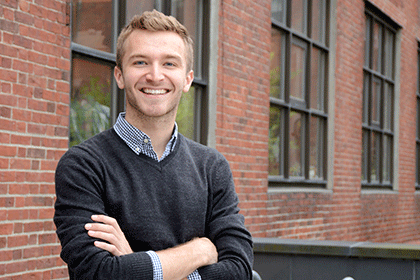To a class of teenagers in Maine, where fresh-water springs, lakes, and brooks abound, the international water crisis seemed unfathomable.
A presentation from the BARKA foundation at his Bangor high school, inspired D.J. Brooks (MCB ’17) to organize a series of 5k road races to raise funds and awareness for water access and hygiene in Burkina Faso. In this small landlocked West African country most people walk 5k daily to retrieve a short supply of often-contaminated well water.
Shortly before matriculating at Harvard in 2013, Brooks incorporated Initiative: Eau, an international non-profit to address Water, Sanitation, and Hygiene (WASH) issues in Burkina Faso and neighboring nations.
I: Eau has since expanded into a team of fourteen staff members across three continents, which Brooks somehow coordinates as President and CEO in his scant free time between classes and lab research.
Brooks credits MCB’s flexible curriculum for supporting his diverse interests: the concentration’s approach “has allowed me the freedom to explore courses like immunology and virology, while ensuring that I have a solid science foundation,” he says. He is currently working in Nicolas Chevrier’s lab at the Center for Systems Biology, where his research “dissect[s] how the immune system differentially responds to various types of pathogens in the skin and how immune information is propagated to lymph nodes.”
Brooks’ research skills, honed by both lab- and course-work, informed one of Initiative: Eau’s most ambitious projects, WASHMobile, for which the organization has been invited to present at the British Medical Association for the International Society for Neglected Tropical Diseases’ Water Conference this November.
Because piped water infrastructure is limited in Burkina, most people drink water from independent public sources that can vary widely in quality. “Through WASHMobile,” says Brooks, “we monitor each of these sources with a simple, cost-effective test kit.” These tests include “indicators of water quality, specifically turbidity and total/fecal coliforms, and can be expanded to include assays for cholera and dysentery.” WASHMobile collects and distributes the results using mobile phone technology, allowing individuals to compare and choose among water supplies, while also “identifying, monitoring, and addressing failing water infrastructure in developing urban areas.” At present, “penetrance of mobile phone technology across Burkina is around 70%,” cites Brooks, though that percentage is greater in the predominantly urban areas WASHmobile targets. Over time, WASHMobile’s information network could dramatically reduce rates of water-borne illness and diarrheal disease.
Last summer, Brooks spent three months laying the groundwork for WASHMobile in Ouagadougou and Fada N’Gourma, Burkina Faso. “The circumstances make it difficult to work there,” admits Brooks, due to “the intense climate, the lack of infrastructure, and the poverty, [but] I’ve absolutely loved having the opportunity to work among and for the people of this country.”
He already plans to return to Burkina after completing his thesis in the Chevrier lab and graduating next spring. He will devote the following two years to I: EAU full-time, ensuring that WASHMobile’s 5-year pilot phase is fully realized, and the initiative’s community WASH projects across Burkina and the capital region of Nigeria continue to expand.
Afterwards, he hopes to specialize in emergency medicine or infectious disease at medical school, and perhaps lend his expertise to a career at the Epidemic Intelligence Service at the CDC, all the while keeping a one foot in the pool at Initiative: Eau.
Yes, like any Harvard undergrad, Brooks is idealistically industrious, and he concedes that “balancing [Initiative: Eau] with other commitments in the lab and in school is challenging and has led to many sleepless nights.” But, after all, “This is what I’m passionate about and it is that passion that keeps me motivated.”For more information about Initiative: Eau, or to lend your support, visit their brand new website, launching August 1st 2016, at initiativeeau.org
D.J. Brooks is a Molecular and Cellular Biology concentrator. Read more about the exciting and unusual accomplishments of other MCB and Neurobiology concentrators in MCB’s Undergraduate Initiatives series.


